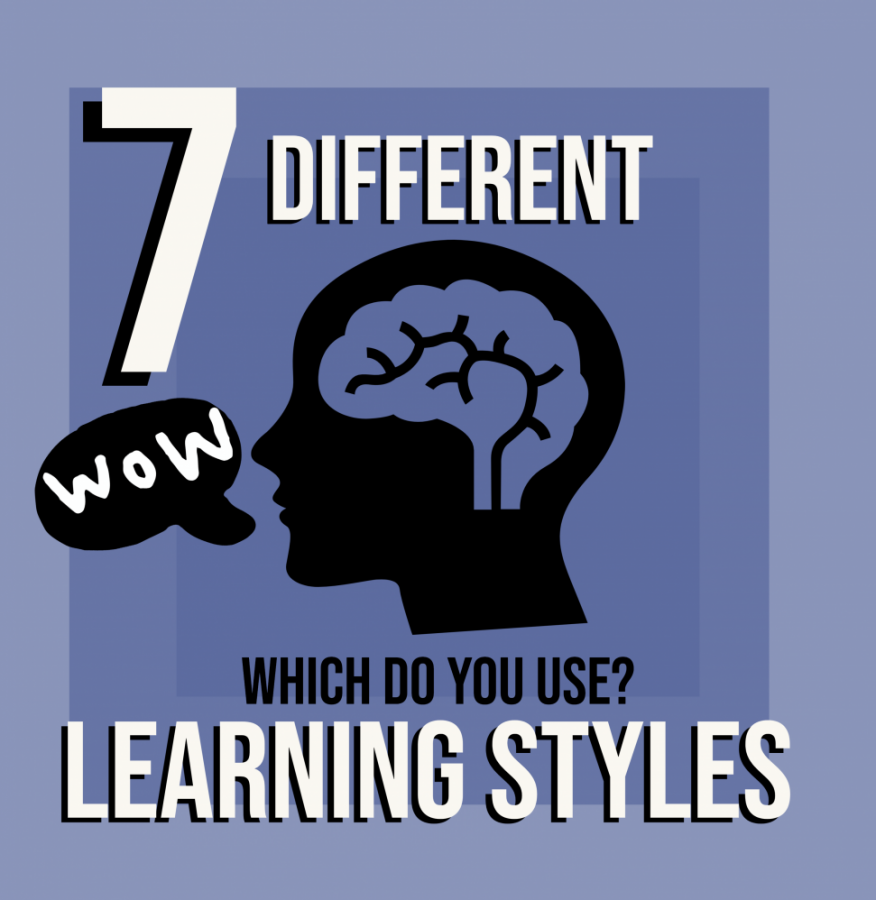Which type of learner are you?
There are seven commonly accepted styles of learning that are observed among students. Each individual is gifted in a specific area of learning, but it is how one is able to use their gift in their weaker areas that truly matters.
February 28, 2021
In any classroom, every student has an individual style of learning and understanding information that guides them throughout their education. As a student, it is necessary to be aware of what works best for you, and how to improve your specific abilities. There are seven generally accepted types of learning, however, it is possible to have a combination.
Verbal learners
These learners tend to favor reading or writing in the classroom and may have a preference for word games and poems. They are very articulate in their vocabulary, and are constantly searching for new stories or words to add to their collection.
If you possess the following qualities, then it is possible you are a verbal learner:
- Intellectual
- Bookworm
- Great storyteller
Tools to help you learn better:
- Take detailed notes
- Discuss different concepts when confused
Logical learners
These students often like when the material is logically explained to them; which is almost guaranteed in subjects such as math or science but is trickier in more interpretive classes. They strive best when given a schedule or system.
If you possess the following qualities, then it is possible you are a logical learner:
- Excels at grouping and classifying
- Good with numbers
- Often recognizes patterns faster than others
- Likes the answers and questions to be straightforward
Tools to help you learn better:
- Set systems for more creative thinking
- Consider planning one step ahead
Hands-on learners
These types of learners occupy approximately five percent of the population, excelling at working physically with the material at hand. These learners tend to be very energetic and excitable, and they learn best with models or props in which they are able to better understand the information.
If you possess the following qualities, then it is possible you are a hands-on learner:
- Tends to fidget
- Often energetic
- Outgoing and action-oriented
- May not like reading or writing
Tools to help you learn:
- Take breaks to move around
- Declutter workspace to help you focus on the material
- Create models to help you understand
Social learners
Social learners gear towards group collaboration and discussing different ideas; some may even take leadership roles within the group. While not all of these learners are necessarily extroverted, most of them enjoy discussing.
If you possess the following qualities, then it is possible you are a hands-on learner:
- Extraverted
- Usually sensitive and sympathetic
- Good at communicating
Tools to help you learn better:
- Roleplaying events or literature
- Work with the teacher on confusing comprehension questions
- Collaborate with others on math problems
Solitary learners
In a classroom environment, it can sometimes be difficult to engage a solitary learner. They might sit silently in the back of the classroom, only to ace the exam at the end of the semester. For the educator, it’s important to engage them during class.
If you possess the following qualities, then it is possible you are a solitary learner:
- Independent
- Introspective
- Private
Tools to help you learn better:
- Create visual materials
- Sit in a quieter area
- Prepare for group discussions
Auditory learners
These students excel best when the solutions and examples are explained to them and tend to gravitate towards music classes or group discussions to better their learning. They have a high skill in distinguishing notes and tones of speech and music.
If you possess the following qualities, then it is possible you are an auditory learner:
- Has a skill for understanding tones and notes
- Often likes to talk to self or others
- Likes to hum/sing
- May be distractible
Tools to help you learn better:
- Use auditory cues to better understand the information
- Create songs or specific words to retain the information
Visual learners
These students often rely on diagrams, charts or drawing out the problem. They learn by creating visual representations and watching others utilize them, and they tend to be organized and creative in their approach. Colors and shapes oftentimes guide these students’ thought processes and allow them to grasp the information faster and with less difficulty.
If you possess the following qualities, then it is possible you are a visual learner:
- Enjoys planning
- Doodles often
- Observant
- Not easily distracted
- Prefers visual instructions
Tools to help you learn better:
- Consider sitting near the front for a better visual image
- Use color codes and cues
- Take detailed notes with color codes and graphs
- Review the notes and consider rewriting them
Even if you obtain a combination of these styles, it is still useful to not only understand them but also how to highlight them; which will, in turn, benefit you greatly in your education and in your day-to-day life.









